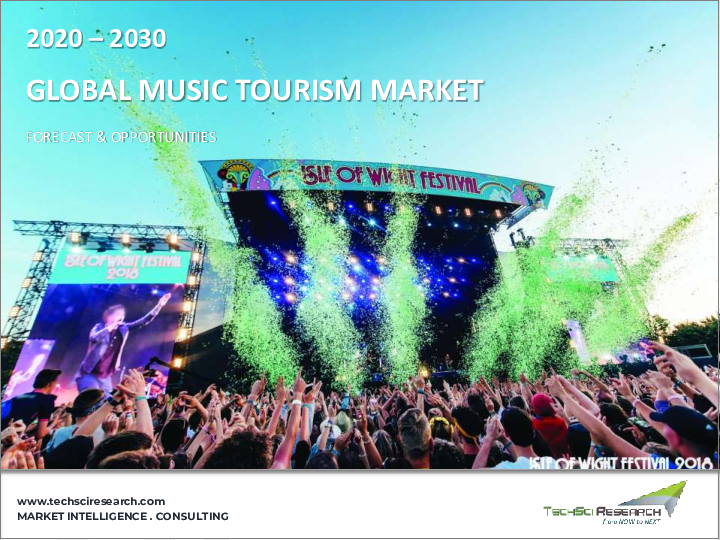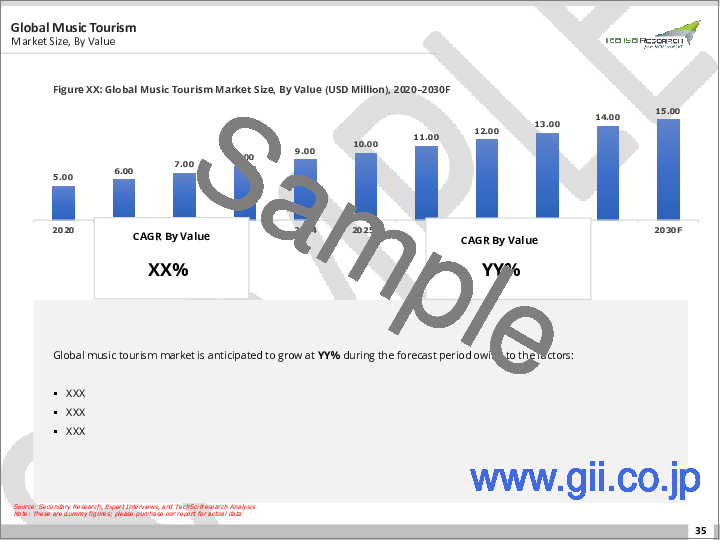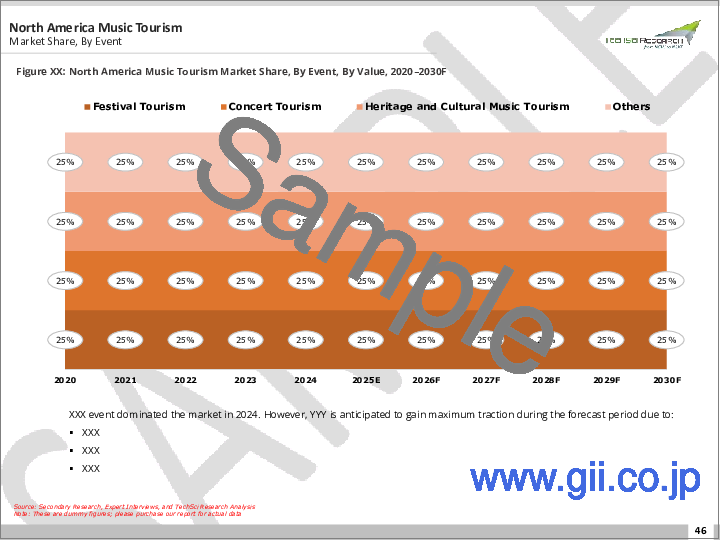|
|
市場調査レポート
商品コード
1719200
音楽観光市場- 世界の産業規模、シェア、動向、機会、予測、イベント別、年齢層別、予約モード別、地域別、競合市場別、2020-2030年Music Tourism Market - Global Industry Size, Share, Trends, Opportunity, and Forecast, Segmented By Event, By Age Group, By Booking Mode, By Region & Competition, 2020-2030F |
||||||
カスタマイズ可能
|
|||||||
| 音楽観光市場- 世界の産業規模、シェア、動向、機会、予測、イベント別、年齢層別、予約モード別、地域別、競合市場別、2020-2030年 |
|
出版日: 2025年04月30日
発行: TechSci Research
ページ情報: 英文 185 Pages
納期: 2~3営業日
|
全表示
- 概要
- 目次
音楽観光の世界市場規模は2024年に69億1,000万米ドル、2030年には123億米ドルに達し、予測期間中のCAGRは10.14%で成長すると予測されています。
音楽観光分野は近年、Taylor SwiftのErasツアーやCoachellaのような世界的に有名なフェスティバルのような象徴的なイベントに後押しされ、大幅な成長を遂げています。2023年には欧州全土でコンサート観光の予約が急増し、2024年にはタイ、シンガポール、アブダビを中心とする東南アジア全域で活動が活発化し、コンサート主導型観光への世界のシフトが浮き彫りになりました。BTSは、その影響力だけで韓国のGDPに約0.3%貢献しており、音楽イベントをより広範な観光戦略に組み込むことの大きな経済的可能性を強調しています。
| 市場概要 | |
|---|---|
| 予測期間 | 2026-2030 |
| 市場規模:2024年 | 69億1,000万米ドル |
| 市場規模:2030年 | 123億米ドル |
| CAGR:2025年~2030年 | 10.14% |
| 急成長セグメント | ダイレクトブッキング |
| 最大市場 | 北米 |
体験型旅行が音楽観光の重要な推進力として台頭しており、2024年のコンサート・パッケージの問い合わせの66%が24歳から35歳の個人によるものです。テイラー・スウィフトのErasツアーだけでも、北米から22億米ドルのチケット売上が予測されています。一方、K-POPの世界の影響力は、毎年何百万人ものファンを韓国に引き寄せ続けています。ロック・イン・リオのようなフェスティバルや、マリオットなどのブランドによるホスピタリティ・イニシアチブは、現代の旅行行動を形成する上で、ライブ音楽体験の役割が高まっていることをさらに強調しています。
市場促進要因
音楽フェスティバルとコンサートの人気上昇
主な市場課題
イベントの持続可能性と環境への影響
主な市場動向
デスティネーション音楽フェスティバルの成長
目次
第1章 イントロダクション
第2章 調査手法
第3章 エグゼクティブサマリー
第4章 顧客の声分析
- ブランド認知度
- 購買決定に影響を与える要因
第5章 世界の音楽観光市場展望
- 市場規模・予測
- 金額別
- 市場シェア・予測
- イベント別(コンサート、フェスティバル、その他)
- 年齢別(18歳以下、18~34歳、34~54歳、55歳以上)
- 予約方法別(直接予約、旅行代理店、オンライン旅行代理店)
- 地域別
- 企業別(2024)
- 市場マップ
第6章 北米の音楽観光市場展望
- 市場規模・予測
- 市場シェア・予測
- 北米:国別分析
- 米国
- カナダ
- メキシコ
第7章 欧州の音楽観光市場展望
- 市場規模・予測
- 市場シェア・予測
- 欧州:国別分析
- フランス
- ドイツ
- スペイン
- イタリア
- 英国
第8章 アジア太平洋地域の音楽観光市場展望
- 市場規模・予測
- 市場シェア・予測
- アジア太平洋地域:国別分析
- 中国
- 日本
- インド
- ベトナム
- 韓国
第9章 中東・アフリカの音楽観光市場展望
- 市場規模・予測
- 市場シェア・予測
- 中東・アフリカ:国別分析
- 南アフリカ
- サウジアラビア
- アラブ首長国連邦
- トルコ
- クウェート
- エジプト
第10章 南米の音楽観光市場展望
- 市場規模・予測
- 市場シェア・予測
- 南米:国別分析
- ブラジル
- アルゼンチン
- コロンビア
第11章 市場力学
- 促進要因
- 課題
第12章 市場動向と発展
- 合併と買収
- 製品上市
- 最近の動向
第13章 ポーターのファイブフォース分析
- 業界内の競合
- 新規参入の可能性
- サプライヤーの力
- 顧客の力
- 代替品の脅威
第14章 競合情勢
- 企業プロファイル
- Coachella Valley Music and Arts Festival
- Glastonbury Festival
- Tomorrowland
- Lollapalooza
- AEG Presents
- Ticketmaster
- Live Nation Entertainment
- Royal Albert Hall
- Madison Square Garden
- Fuji Rock Festival
第15章 戦略的提言
第16章 調査会社について・免責事項
The global Music Tourism Market was valued at USD 6.91 billion in 2024 and is projected to reach USD 12.30 billion by 2030, growing at a CAGR of 10.14% during the forecast period. The music tourism sector has witnessed substantial growth in recent years, fueled by iconic events such as Taylor Swift's Eras Tour and globally renowned festivals like Coachella. In 2023, concert tourism bookings surged across Europe, and 2024 has seen heightened activity across Southeast Asia, notably in Thailand, Singapore, and Abu Dhabi, highlighting a global shift towards concert-driven tourism. A compelling example is BTS, whose influence alone contributed approximately 0.3% to South Korea's GDP, underscoring the significant economic potential of integrating music events into broader tourism strategies.
| Market Overview | |
|---|---|
| Forecast Period | 2026-2030 |
| Market Size 2024 | USD 6.91 Billion |
| Market Size 2030 | USD 12.30 Billion |
| CAGR 2025-2030 | 10.14% |
| Fastest Growing Segment | Direct Booking |
| Largest Market | North America |
Experiential travel is emerging as a critical driver of music tourism, with 66% of concert package inquiries in 2024 coming from individuals aged 24 to 35. Taylor Swift's Eras Tour alone is projected to generate USD 2.2 billion in ticket sales from North America. Meanwhile, K-pop's global influence continues to draw millions of fans annually to South Korea. Festivals like Rock in Rio and hospitality initiatives by brands such as Marriott further emphasize the growing role of live music experiences in shaping modern travel behavior.
Market Drivers
Rising Popularity of Music Festivals and Concerts
Music festivals and major concerts have evolved into global cultural phenomena, attracting millions of attendees annually. These events offer more than performances; they provide immersive experiences that blend entertainment, culture, and community engagement. Iconic festivals such as Coachella (U.S.), Glastonbury (U.K.), and Tomorrowland (Belgium) have cultivated international followings, encouraging domestic and international travel. Fans often plan comprehensive trips around these events, contributing significantly to local economies through accommodation, dining, and exploration of nearby attractions. Many festivals are strategically situated in scenic or culturally significant locations, making the destination a core part of the overall experience.
Tourism boards increasingly support or sponsor music festivals to boost visitor numbers and generate economic impact. The exclusivity and time-bound nature of these events create a sense of urgency and foster repeat attendance. With travelers seeking memorable, emotionally resonant experiences, music tourism is poised for continued expansion.
Key Market Challenges
Event Sustainability and Environmental Impact
Music tourism, especially involving large-scale festivals and concerts, poses significant environmental and logistical challenges. These events often generate considerable waste, increase energy demands, and contribute to pollution. Popular destinations can suffer from overtourism, leading to environmental degradation and straining local infrastructure. Remote festival sites frequently require extensive transportation logistics, further elevating carbon emissions. Additionally, litter, damage to natural landscapes, and pressure on urban resources are recurring concerns.
As travelers become more environmentally conscious, there is mounting pressure on event organizers to adopt sustainable practices such as waste minimization, renewable energy use, carbon offsetting, and responsible sourcing. However, implementing green initiatives can be financially and logistically challenging, particularly for smaller or independent events. Balancing the commercial growth of music tourism with environmentally responsible practices is critical to maintaining long-term viability and preserving destination appeal.
Key Market Trends
Growth of Destination Music Festivals
A major trend reshaping music tourism is the rise of destination music festivals-events strategically hosted in picturesque or culturally rich locations to attract global audiences. Festivals such as Ultra Music Festival (Miami), Sonar (Barcelona), and BaliSpirit Festival (Indonesia) integrate music with travel, lifestyle, and leisure, creating fully immersive experiences. Travelers often extend their stays to explore local culture, cuisine, and natural beauty beyond the festival itself.
Organizers increasingly differentiate their festivals by emphasizing unique settings and authentic local experiences, often incorporating regional artists, food vendors, and traditions. This trend is further supported by tourism boards and local governments eager to boost international exposure and economic activity. To cater to the growing premium segment, many festivals now offer all-inclusive travel packages, VIP experiences, and curated itineraries. As a result, destination music festivals are driving cross-border tourism and fostering a new niche that combines music, adventure, and cultural immersion-transforming how travelers engage with live music globally.
Key Market Players
- Coachella Valley Music and Arts Festival
- Glastonbury Festival
- Tomorrowland
- Lollapalooza
- AEG Presents
- Ticketmaster
- Live Nation Entertainment
- Royal Albert Hall
- Madison Square Garden
- Fuji Rock Festival
Report Scope:
In this report, the global Music Tourism Market has been segmented into the following categories, along with detailed analysis of key industry trends:
Music Tourism Market, By Event:
- Concert
- Festival
- Others
Music Tourism Market, By Age Group:
- 18 and Less
- 18-34 Years
- 34-54 Years
- 55+ Years
Music Tourism Market, By Booking Mode:
- Direct Booking
- Travel Agents
- Online Travel Agencies
Music Tourism Market, By Region:
- North America
- United States
- Canada
- Mexico
- Europe
- France
- Germany
- Spain
- Italy
- United Kingdom
- Asia-Pacific
- China
- Japan
- India
- Vietnam
- South Korea
- Middle East & Africa
- South Africa
- Saudi Arabia
- UAE
- Turkey
- Kuwait
- Egypt
- South America
- Brazil
- Argentina
- Colombia
Competitive Landscape
Company Profiles: Detailed analysis of major companies operating in the global Music Tourism Market.
Available Customizations:
With the provided market data, TechSci Research offers customization options based on specific company requirements, including:
- Detailed analysis and profiling of additional market players (up to five).
Table of Contents
1. Introduction
- 1.1. Product Overview
- 1.2. Key Highlights of the Report
- 1.3. Market Coverage
- 1.4. Market Segments Covered
- 1.5. Research Tenure Considered
2. Research Methodology
- 2.1. Methodology Landscape
- 2.2. Objective of the Study
- 2.3. Baseline Methodology
- 2.4. Formulation of the Scope
- 2.5. Assumptions and Limitations
- 2.6. Sources of Research
- 2.7. Approach for the Market Study
- 2.8. Methodology Followed for Calculation of Market Size & Market Shares
- 2.9. Forecasting Methodology
3. Executive Summary
- 3.1. Overview of the Market
- 3.2. Overview of Key Market Segmentations
- 3.3. Overview of Key Market Players
- 3.4. Overview of Key Regions
- 3.5. Overview of Market Drivers, Challenges, and Trends
4. Voice of Customer Analysis
- 4.1. Brand Awareness
- 4.2. Factor Influencing Purchasing Decision
5. Global Music Tourism Market Outlook
- 5.1. Market Size & Forecast
- 5.1.1. By Value
- 5.2. Market Share & Forecast
- 5.2.1. By Event (Concert, Festival, Others)
- 5.2.2. By Age Group (18 And Less, 18 - 34 Years, 34 - 54 Years, 55+ Years)
- 5.2.3. By Booking Mode (Direct Booking, Travel Agents, Online Travel Agencies)
- 5.2.4. By Region
- 5.2.5. By Company (2024)
- 5.3. Market Map
6. North America Music Tourism Market Outlook
- 6.1. Market Size & Forecast
- 6.1.1. By Value
- 6.2. Market Share & Forecast
- 6.2.1. By Event
- 6.2.2. By Age Group
- 6.2.3. By Booking Mode
- 6.2.4. By Country
- 6.3. North America: Country Analysis
- 6.3.1. United States Music Tourism Market Outlook
- 6.3.1.1. Market Size & Forecast
- 6.3.1.1.1. By Value
- 6.3.1.2. Market Share & Forecast
- 6.3.1.2.1. By Event
- 6.3.1.2.2. By Age Group
- 6.3.1.2.3. By Booking Mode
- 6.3.1.1. Market Size & Forecast
- 6.3.2. Canada Music Tourism Market Outlook
- 6.3.2.1. Market Size & Forecast
- 6.3.2.1.1. By Value
- 6.3.2.2. Market Share & Forecast
- 6.3.2.2.1. By Event
- 6.3.2.2.2. By Age Group
- 6.3.2.2.3. By Booking Mode
- 6.3.2.1. Market Size & Forecast
- 6.3.3. Mexico Music Tourism Market Outlook
- 6.3.3.1. Market Size & Forecast
- 6.3.3.1.1. By Value
- 6.3.3.2. Market Share & Forecast
- 6.3.3.2.1. By Event
- 6.3.3.2.2. By Age Group
- 6.3.3.2.3. By Booking Mode
- 6.3.3.1. Market Size & Forecast
- 6.3.1. United States Music Tourism Market Outlook
7. Europe Music Tourism Market Outlook
- 7.1. Market Size & Forecast
- 7.1.1. By Value
- 7.2. Market Share & Forecast
- 7.2.1. By Event
- 7.2.2. By Age Group
- 7.2.3. By Booking Mode
- 7.2.4. By Country
- 7.3. Europe: Country Analysis
- 7.3.1. France Music Tourism Market Outlook
- 7.3.1.1. Market Size & Forecast
- 7.3.1.1.1. By Value
- 7.3.1.2. Market Share & Forecast
- 7.3.1.2.1. By Event
- 7.3.1.2.2. By Age Group
- 7.3.1.2.3. By Booking Mode
- 7.3.1.1. Market Size & Forecast
- 7.3.2. Germany Music Tourism Market Outlook
- 7.3.2.1. Market Size & Forecast
- 7.3.2.1.1. By Value
- 7.3.2.2. Market Share & Forecast
- 7.3.2.2.1. By Event
- 7.3.2.2.2. By Age Group
- 7.3.2.2.3. By Booking Mode
- 7.3.2.1. Market Size & Forecast
- 7.3.3. Spain Music Tourism Market Outlook
- 7.3.3.1. Market Size & Forecast
- 7.3.3.1.1. By Value
- 7.3.3.2. Market Share & Forecast
- 7.3.3.2.1. By Event
- 7.3.3.2.2. By Age Group
- 7.3.3.2.3. By Booking Mode
- 7.3.3.1. Market Size & Forecast
- 7.3.4. Italy Music Tourism Market Outlook
- 7.3.4.1. Market Size & Forecast
- 7.3.4.1.1. By Value
- 7.3.4.2. Market Share & Forecast
- 7.3.4.2.1. By Event
- 7.3.4.2.2. By Age Group
- 7.3.4.2.3. By Booking Mode
- 7.3.4.1. Market Size & Forecast
- 7.3.5. United Kingdom Music Tourism Market Outlook
- 7.3.5.1. Market Size & Forecast
- 7.3.5.1.1. By Value
- 7.3.5.2. Market Share & Forecast
- 7.3.5.2.1. By Event
- 7.3.5.2.2. By Age Group
- 7.3.5.2.3. By Booking Mode
- 7.3.5.1. Market Size & Forecast
- 7.3.1. France Music Tourism Market Outlook
8. Asia-Pacific Music Tourism Market Outlook
- 8.1. Market Size & Forecast
- 8.1.1. By Value
- 8.2. Market Share & Forecast
- 8.2.1. By Event
- 8.2.2. By Age Group
- 8.2.3. By Booking Mode
- 8.2.4. By Country
- 8.3. Asia-Pacific: Country Analysis
- 8.3.1. China Music Tourism Market Outlook
- 8.3.1.1. Market Size & Forecast
- 8.3.1.1.1. By Value
- 8.3.1.2. Market Share & Forecast
- 8.3.1.2.1. By Event
- 8.3.1.2.2. By Age Group
- 8.3.1.2.3. By Booking Mode
- 8.3.1.1. Market Size & Forecast
- 8.3.2. Japan Music Tourism Market Outlook
- 8.3.2.1. Market Size & Forecast
- 8.3.2.1.1. By Value
- 8.3.2.2. Market Share & Forecast
- 8.3.2.2.1. By Event
- 8.3.2.2.2. By Age Group
- 8.3.2.2.3. By Booking Mode
- 8.3.2.1. Market Size & Forecast
- 8.3.3. India Music Tourism Market Outlook
- 8.3.3.1. Market Size & Forecast
- 8.3.3.1.1. By Value
- 8.3.3.2. Market Share & Forecast
- 8.3.3.2.1. By Event
- 8.3.3.2.2. By Age Group
- 8.3.3.2.3. By Booking Mode
- 8.3.3.1. Market Size & Forecast
- 8.3.4. Vietnam Music Tourism Market Outlook
- 8.3.4.1. Market Size & Forecast
- 8.3.4.1.1. By Value
- 8.3.4.2. Market Share & Forecast
- 8.3.4.2.1. By Event
- 8.3.4.2.2. By Age Group
- 8.3.4.2.3. By Booking Mode
- 8.3.4.1. Market Size & Forecast
- 8.3.5. South Korea Music Tourism Market Outlook
- 8.3.5.1. Market Size & Forecast
- 8.3.5.1.1. By Value
- 8.3.5.2. Market Share & Forecast
- 8.3.5.2.1. By Event
- 8.3.5.2.2. By Age Group
- 8.3.5.2.3. By Booking Mode
- 8.3.5.1. Market Size & Forecast
- 8.3.1. China Music Tourism Market Outlook
9. Middle East & Africa Music Tourism Market Outlook
- 9.1. Market Size & Forecast
- 9.1.1. By Value
- 9.2. Market Share & Forecast
- 9.2.1. By Event
- 9.2.2. By Age Group
- 9.2.3. By Booking Mode
- 9.2.4. By Country
- 9.3. MEA: Country Analysis
- 9.3.1. South Africa Music Tourism Market Outlook
- 9.3.1.1. Market Size & Forecast
- 9.3.1.1.1. By Value
- 9.3.1.2. Market Share & Forecast
- 9.3.1.2.1. By Event
- 9.3.1.2.2. By Age Group
- 9.3.1.2.3. By Booking Mode
- 9.3.1.1. Market Size & Forecast
- 9.3.2. Saudi Arabia Music Tourism Market Outlook
- 9.3.2.1. Market Size & Forecast
- 9.3.2.1.1. By Value
- 9.3.2.2. Market Share & Forecast
- 9.3.2.2.1. By Event
- 9.3.2.2.2. By Age Group
- 9.3.2.2.3. By Booking Mode
- 9.3.2.1. Market Size & Forecast
- 9.3.3. UAE Music Tourism Market Outlook
- 9.3.3.1. Market Size & Forecast
- 9.3.3.1.1. By Value
- 9.3.3.2. Market Share & Forecast
- 9.3.3.2.1. By Event
- 9.3.3.2.2. By Age Group
- 9.3.3.2.3. By Booking Mode
- 9.3.3.1. Market Size & Forecast
- 9.3.4. Turkey Music Tourism Market Outlook
- 9.3.4.1. Market Size & Forecast
- 9.3.4.1.1. By Value
- 9.3.4.2. Market Share & Forecast
- 9.3.4.2.1. By Event
- 9.3.4.2.2. By Age Group
- 9.3.4.2.3. By Booking Mode
- 9.3.4.1. Market Size & Forecast
- 9.3.5. Kuwait Music Tourism Market Outlook
- 9.3.5.1. Market Size & Forecast
- 9.3.5.1.1. By Value
- 9.3.5.2. Market Share & Forecast
- 9.3.5.2.1. By Event
- 9.3.5.2.2. By Age Group
- 9.3.5.2.3. By Booking Mode
- 9.3.5.1. Market Size & Forecast
- 9.3.6. Egypt Music Tourism Market Outlook
- 9.3.6.1. Market Size & Forecast
- 9.3.6.1.1. By Value
- 9.3.6.2. Market Share & Forecast
- 9.3.6.2.1. By Event
- 9.3.6.2.2. By Age Group
- 9.3.6.2.3. By Booking Mode
- 9.3.6.1. Market Size & Forecast
- 9.3.1. South Africa Music Tourism Market Outlook
10. South America Music Tourism Market Outlook
- 10.1. Market Size & Forecast
- 10.1.1. By Value
- 10.2. Market Share & Forecast
- 10.2.1. By Event
- 10.2.2. By Age Group
- 10.2.3. By Booking Mode
- 10.2.4. By Country
- 10.3. South America: Country Analysis
- 10.3.1. Brazil Music Tourism Market Outlook
- 10.3.1.1. Market Size & Forecast
- 10.3.1.1.1. By Value
- 10.3.1.2. Market Share & Forecast
- 10.3.1.2.1. By Event
- 10.3.1.2.2. By Age Group
- 10.3.1.2.3. By Booking Mode
- 10.3.1.1. Market Size & Forecast
- 10.3.2. Argentina Music Tourism Market Outlook
- 10.3.2.1. Market Size & Forecast
- 10.3.2.1.1. By Value
- 10.3.2.2. Market Share & Forecast
- 10.3.2.2.1. By Event
- 10.3.2.2.2. By Age Group
- 10.3.2.2.3. By Booking Mode
- 10.3.2.1. Market Size & Forecast
- 10.3.3. Colombia Music Tourism Market Outlook
- 10.3.3.1. Market Size & Forecast
- 10.3.3.1.1. By Value
- 10.3.3.2. Market Share & Forecast
- 10.3.3.2.1. By Event
- 10.3.3.2.2. By Age Group
- 10.3.3.2.3. By Booking Mode
- 10.3.3.1. Market Size & Forecast
- 10.3.1. Brazil Music Tourism Market Outlook
11. Market Dynamics
- 11.1. Drivers
- 11.2. Challenges
12. Market Trends & Developments
- 12.1. Merger & Acquisition (If Any)
- 12.2. Product Launches (If Any)
- 12.3. Recent Developments
13. Porters Five Forces Analysis
- 13.1. Competition in the Industry
- 13.2. Potential of New Entrants
- 13.3. Power of Suppliers
- 13.4. Power of Customers
- 13.5. Threat of Substitute Products
14. Competitive Landscape
- 14.1. Company Profiles
- 14.1.1. Coachella Valley Music and Arts Festival
- 14.1.1.1. Business Overview
- 14.1.1.2. Company Snapshot
- 14.1.1.3. Products & Services
- 14.1.1.4. Financials (As Per Availability)
- 14.1.1.5. Key Market Focus & Geographical Presence
- 14.1.1.6. Recent Developments
- 14.1.1.7. Key Management Personnel
- 14.1.2. Glastonbury Festival
- 14.1.3. Tomorrowland
- 14.1.4. Lollapalooza
- 14.1.5. AEG Presents
- 14.1.6. Ticketmaster
- 14.1.7. Live Nation Entertainment
- 14.1.8. Royal Albert Hall
- 14.1.9. Madison Square Garden
- 14.1.10. Fuji Rock Festival
- 14.1.1. Coachella Valley Music and Arts Festival





